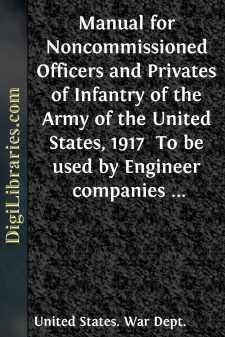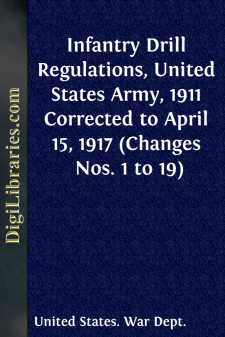Categories
- Antiques & Collectibles 13
- Architecture 36
- Art 48
- Bibles 22
- Biography & Autobiography 813
- Body, Mind & Spirit 142
- Business & Economics 28
- Children's Books 15
- Children's Fiction 12
- Computers 4
- Cooking 94
- Crafts & Hobbies 4
- Drama 346
- Education 46
- Family & Relationships 57
- Fiction 11828
- Games 19
- Gardening 17
- Health & Fitness 34
- History 1377
- House & Home 1
- Humor 147
- Juvenile Fiction 1873
- Juvenile Nonfiction 202
- Language Arts & Disciplines 88
- Law 16
- Literary Collections 686
- Literary Criticism 179
- Mathematics 13
- Medical 41
- Music 40
- Nature 179
- Non-Classifiable 1768
- Performing Arts 7
- Periodicals 1453
- Philosophy 64
- Photography 2
- Poetry 896
- Political Science 203
- Psychology 42
- Reference 154
- Religion 513
- Science 126
- Self-Help 84
- Social Science 81
- Sports & Recreation 34
- Study Aids 3
- Technology & Engineering 59
- Transportation 23
- Travel 463
- True Crime 29
Manual for Noncommissioned Officers and Privates of Infantry of the Army of the United States, 1917 To be used by Engineer companies (dismounted) and Coast Artillery companies for Infantry instruction and training
Description:
Excerpt
CHAPTER I.
MILITARY DISCIPLINE AND COURTESY.
Section 1. Oath of enlistment.
Every soldier on enlisting in the Army takes upon himself the following obligation:
"I,--------, do solemnly swear (or affirm) that I will bear true faith and allegiance to the United States of America; that I will serve them honestly and faithfully against all their enemies whomsoever; and that I will obey the orders of the President of the United States, and the orders of the officers appointed over me according to the Rules and Articles of War." (109th Article of War.)
The very first paragraph in the Army Regulations reads:
"All persons in the military service are required to obey strictly and to execute promptly the lawful orders of their superiors."
Obedience is the first and last duty of a soldier. It is the foundation upon which all military efficiency is built. Without it an army becomes a mob, while with it a mob ceases to be a mob and becomes possessed of much of the power of an organized force. It is a quality that is demanded of every person in the Army, from the highest to the lowest. Each enlisted man binds himself, by his enlistment oath, to obedience. Each officer, in accepting his commission, must take upon himself the same solemn obligation.
Obey strictly and execute promptly the lawful orders of your superiors. It is enough to know that the person giving the order, whether he be an officer, a noncommissioned officer, or a private acting as such, is your lawful superior. You may not like him, you may not respect him, but you must respect his position and authority, and reflect honor and credit upon yourself and your profession by yielding to all superiors that complete and unhesitating obedience which is the pleasure as well as the duty of every true soldier.
Orders must be strictly carried out. It is not sufficient to comply with only that part which suits you or which involves no work or danger or hardship. Nor is it proper or permissible, when you are ordered to do a thing in a certain way or to accomplish a work in a definitely prescribed manner, for you to obtain the same results by other methods.
Obedience must be prompt and unquestioning. When any soldier (and this word includes officers as well as enlisted men) receives an order, it is not for him to consider whether the order is a good one or not, whether it would have been better had such an order never been given, or whether the duty might be better performed by some one else, or at some other time, or in some other manner. His duty is, first, to understand just what the order requires, and, second, to proceed at once to carry out the order to the best of his ability.
"Officers and men of all ranks and grades are given a certain independence in the execution of the tasks to which they are assigned and are expected to show initiative in meeting the different situations as they arise. Every individual, from the highest commander to the lowest private, must always remember that inaction and neglect of opportunities will warrant more severe censure than an error in the choice of the means." (Preface, Field Service Regulations.)



